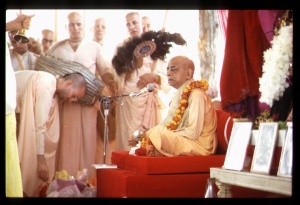SB 10.81.5: Difference between revisions
m (1 revision(s)) |
(Vanibot #0054 edit - transform synonyms into clickable links, which search similar occurrences) |
||
| (One intermediate revision by one other user not shown) | |||
| Line 1: | Line 1: | ||
{{info | {{info | ||
|speaker= | |speaker=Śukadeva Gosvāmī | ||
|listener=King | |listener=King Parīkṣit | ||
}} | }} | ||
[[Category:Srimad-Bhagavatam - Canto 10 Chapter 81|s05]] | |||
[[Category:Bhagavatam Verses Spoken by Sukadeva Gosvami - Vanisource|108105]] | |||
<div style="float:left">'''[[Srimad-Bhagavatam]] - [[SB 10|Tenth Canto]] - [[SB 10.81: The Lord Blesses Sudama Brahmana|Chapter 81: The Lord Blesses Sudāmā Brāhmaṇa]]'''</div> | |||
<div style="float:right">[[File:Go-previous.png|link=SB 10.81.4]] '''[[SB 10.81.4]] - [[SB 10.81.6-7]]''' [[File:Go-next.png|link=SB 10.81.6-7]]</div> | |||
{{RandomImage}} | |||
{{SBnotice}} | |||
==== TEXT 5 ==== | ==== TEXT 5 ==== | ||
<div | <div class="verse"> | ||
ity ukto 'pi dviyas tasmai | :ity ukto 'pi dviyas tasmai | ||
vrīḍitaḥ pataye śriyaḥ | :vrīḍitaḥ pataye śriyaḥ | ||
pṛthuka-prasṛtiṁ rājan | :pṛthuka-prasṛtiṁ rājan | ||
na prāyacchad avāṅ-mukhaḥ | :na prāyacchad avāṅ-mukhaḥ | ||
</div> | </div> | ||
| Line 17: | Line 22: | ||
==== SYNONYMS ==== | ==== SYNONYMS ==== | ||
<div | <div class="synonyms"> | ||
''[//vanipedia.org/wiki/Special:VaniSearch?s=iti&tab=syno_o&ds=1 iti]'' — thus; ''[//vanipedia.org/wiki/Special:VaniSearch?s=uktaḥ&tab=syno_o&ds=1 uktaḥ]'' — addressed; ''[//vanipedia.org/wiki/Special:VaniSearch?s=api&tab=syno_o&ds=1 api]'' — although; ''[//vanipedia.org/wiki/Special:VaniSearch?s=dvijaḥ&tab=syno_o&ds=1 dvijaḥ]'' — the brāhmaṇa; ''[//vanipedia.org/wiki/Special:VaniSearch?s=tasmai&tab=syno_o&ds=1 tasmai]'' — to Him; ''[//vanipedia.org/wiki/Special:VaniSearch?s=vrīḍitaḥ&tab=syno_o&ds=1 vrīḍitaḥ]'' — embarrassed; ''[//vanipedia.org/wiki/Special:VaniSearch?s=pataye&tab=syno_o&ds=1 pataye]'' — to the husband; ''[//vanipedia.org/wiki/Special:VaniSearch?s=śriyaḥ&tab=syno_o&ds=1 śriyaḥ]'' — of the goddess of fortune; ''[//vanipedia.org/wiki/Special:VaniSearch?s=pṛthuka&tab=syno_o&ds=1 pṛthuka]'' — of flat rice; ''[//vanipedia.org/wiki/Special:VaniSearch?s=prasṛtim&tab=syno_o&ds=1 prasṛtim]'' — the palmfuls; ''[//vanipedia.org/wiki/Special:VaniSearch?s=rājan&tab=syno_o&ds=1 rājan]'' — O King (Parīkṣit); ''[//vanipedia.org/wiki/Special:VaniSearch?s=na&tab=syno_o&ds=1 na] [//vanipedia.org/wiki/Special:VaniSearch?s=prāyacchat&tab=syno_o&ds=1 prāyacchat]'' — did not offer; ''[//vanipedia.org/wiki/Special:VaniSearch?s=avāk&tab=syno_o&ds=1 avāk]'' — bowed down; ''[//vanipedia.org/wiki/Special:VaniSearch?s=mukhaḥ&tab=syno_o&ds=1 mukhaḥ]'' — whose head. | |||
</div> | </div> | ||
{{SBcollapse}} | |||
==== TRANSLATION ==== | ==== TRANSLATION ==== | ||
<div | <div class="translation"> | ||
[Śukadeva Gosvāmī continued:] Even after being addressed in this way, O King, the brāhmaṇa felt too embarrassed to offer his palmfuls of flat rice to the husband of the goddess of fortune. He simply kept his head bowed in shame. | [Śukadeva Gosvāmī continued:] Even after being addressed in this way, O King, the brāhmaṇa felt too embarrassed to offer his palmfuls of flat rice to the husband of the goddess of fortune. He simply kept his head bowed in shame. | ||
</div> | </div> | ||
| Line 31: | Line 36: | ||
==== PURPORT ==== | ==== PURPORT ==== | ||
<div | <div class="purport"> | ||
According to Ācārya Viśvanātha Cakravartī, the description here of Kṛṣṇa as "the husband of the goddess of fortune" implies that Sudāmā questioned himself, "How can the Lord of Śrī eat this hard, stale rice?" By bowing his head, the brāhmaṇa revealed his meditation: "My dear master, please do not make me ashamed. Even if You request it from me repeatedly, I will not give this to You. I have made up my mind." But the Lord countered with His own thought: "The intention you had fixed in your mind while coming here must not be frustrated, for you are My devotee." | According to Ācārya Viśvanātha Cakravartī, the description here of Kṛṣṇa as "the husband of the goddess of fortune" implies that Sudāmā questioned himself, "How can the Lord of Śrī eat this hard, stale rice?" By bowing his head, the ''brāhmaṇa'' revealed his meditation: "My dear master, please do not make me ashamed. Even if You request it from me repeatedly, I will not give this to You. I have made up my mind." But the Lord countered with His own thought: "The intention you had fixed in your mind while coming here must not be frustrated, for you are My devotee." | ||
</div> | </div> | ||
__NOTOC__ | </div> | ||
</div> | |||
<div style="float:right">[[File:Go-previous.png|link=SB 10.81.4]] '''[[SB 10.81.4]] - [[SB 10.81.6-7]]''' [[File:Go-next.png|link=SB 10.81.6-7]]</div> | |||
__NOTOC__ | |||
__NOEDITSECTION__ | |||
Latest revision as of 20:03, 17 February 2024

A.C. Bhaktivedanta Swami Prabhupada
Please note: The synonyms, translation and purport of this verse were composed by disciples of Śrīla Prabhupāda
TEXT 5
- ity ukto 'pi dviyas tasmai
- vrīḍitaḥ pataye śriyaḥ
- pṛthuka-prasṛtiṁ rājan
- na prāyacchad avāṅ-mukhaḥ
SYNONYMS
iti — thus; uktaḥ — addressed; api — although; dvijaḥ — the brāhmaṇa; tasmai — to Him; vrīḍitaḥ — embarrassed; pataye — to the husband; śriyaḥ — of the goddess of fortune; pṛthuka — of flat rice; prasṛtim — the palmfuls; rājan — O King (Parīkṣit); na prāyacchat — did not offer; avāk — bowed down; mukhaḥ — whose head.
Translation and purport composed by disciples of Śrīla Prabhupāda
TRANSLATION
[Śukadeva Gosvāmī continued:] Even after being addressed in this way, O King, the brāhmaṇa felt too embarrassed to offer his palmfuls of flat rice to the husband of the goddess of fortune. He simply kept his head bowed in shame.
PURPORT
According to Ācārya Viśvanātha Cakravartī, the description here of Kṛṣṇa as "the husband of the goddess of fortune" implies that Sudāmā questioned himself, "How can the Lord of Śrī eat this hard, stale rice?" By bowing his head, the brāhmaṇa revealed his meditation: "My dear master, please do not make me ashamed. Even if You request it from me repeatedly, I will not give this to You. I have made up my mind." But the Lord countered with His own thought: "The intention you had fixed in your mind while coming here must not be frustrated, for you are My devotee."